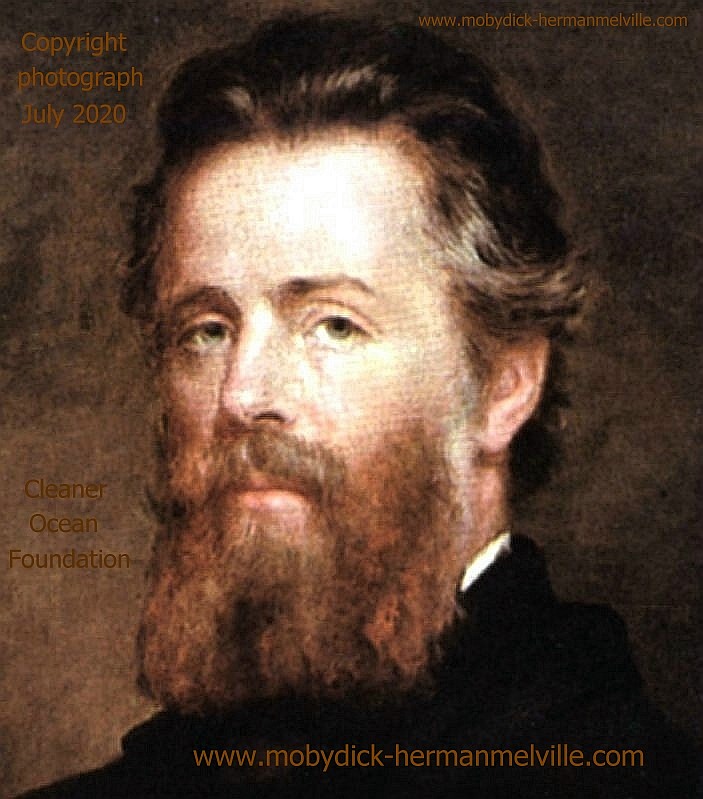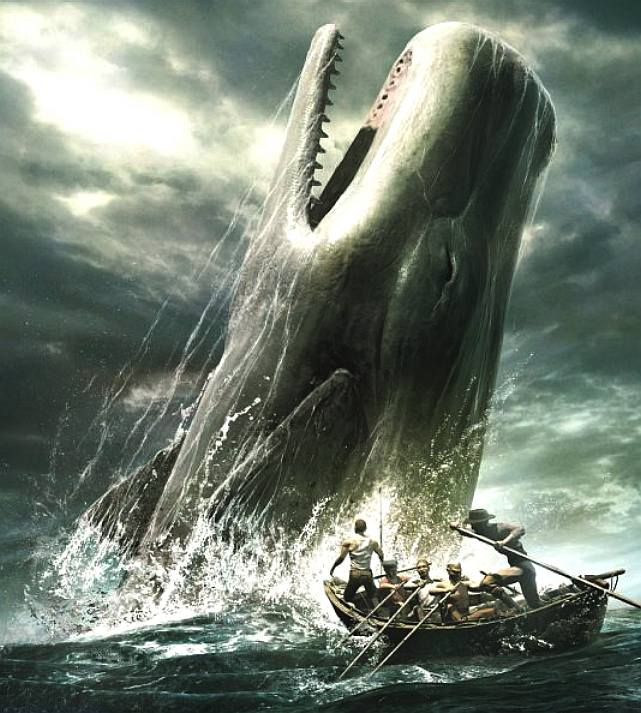
Herman
Melville was the author of an account of what we'd now consider an illegal activity,
the commercial hunting of whales for oil and meat.
Back
<<<
CHAPTER 12. Biographical
Queequeg was a native of Rokovoko, an island far away to the West and South. It is not down in any map; true places never are.
When a new-hatched savage running wild about his native woodlands in a grass clout, followed by the nibbling goats, as if he were a green sapling; even then, in Queequeg's ambitious soul, lurked a strong desire to see something more of Christendom than a specimen whaler or two. His father was a High Chief, a King; his uncle a High Priest; and on the maternal side he boasted aunts who were the wives of unconquerable warriors. There was excellent blood in his veins—royal stuff; though sadly vitiated, I fear, by the cannibal propensity he nourished in his untutored youth.
A Sag Harbor ship visited his father's bay, and Queequeg sought a passage to Christian lands. But the ship, having her full complement of seamen, spurned his suit; and not all the King his father's influence could prevail. But Queequeg vowed a vow. Alone in his canoe, he paddled off to a distant strait, which he knew the ship must pass through when she quitted the island. On one side was a coral reef; on the other a low tongue of land, covered with mangrove thickets that grew out into the water. Hiding his canoe, still afloat, among these thickets, with its prow seaward, he sat down in the stern, paddle low in hand; and when the ship was gliding by, like a flash he darted out; gained her side; with one backward dash of his foot capsized and sank his canoe; climbed up the chains; and throwing himself at full length upon the deck, grappled a ring-bolt there, and swore not to let it go, though hacked in pieces.
In vain the captain threatened to throw him overboard; suspended a cutlass over his naked wrists; Queequeg was the son of a King, and Queequeg budged not. Struck by his desperate dauntlessness, and his wild desire to visit Christendom, the captain at last relented, and told him he might make himself at home. But this fine young savage—this sea Prince of Wales, never saw the Captain's cabin. They put him down among the sailors, and made a whaleman of him. But like Czar Peter content to toil in the shipyards of foreign cities, Queequeg disdained no seeming ignominy, if thereby he might happily gain the power of enlightening his untutored countrymen. For at bottom—so he told me—he was actuated by a profound desire to learn among the Christians, the arts whereby to make his people still happier than they were; and more than that, still better than they were. But, alas! the practices of whalemen soon convinced him that even Christians could be both miserable and wicked; infinitely more so, than all his father's heathens. Arrived at last in old Sag Harbor; and seeing what the sailors did there; and then going on to Nantucket, and seeing how they spent their wages in that place also, poor Queequeg gave it up for lost. Thought he, it's a wicked world in all meridians; I'll die a pagan.
And thus an old idolator at heart, he yet lived among these Christians, wore their clothes, and tried to talk their gibberish. Hence the queer ways about him, though now some time from home.
By hints, I asked him whether he did not propose going back, and having a coronation; since he might now consider his father dead and gone, he being very old and feeble at the last accounts. He answered no, not yet; and added that he was fearful Christianity, or rather Christians, had unfitted him for ascending the pure and undefiled throne of thirty pagan Kings before him. But by and by, he said, he would return,—as soon as he felt himself baptized again. For the nonce, however, he proposed to sail about, and sow his wild oats in all four oceans. They had made a harpooneer of him, and that barbed iron was in lieu of a sceptre now.
I asked him what might be his immediate purpose, touching his future movements. He answered, to go to sea again, in his old vocation. Upon this, I told him that whaling was my own design, and informed him of my intention to sail out of Nantucket, as being the most promising port for an adventurous whaleman to embark from. He at once resolved to accompany me to that island, ship aboard the same vessel, get into the same watch, the same boat, the same mess with me, in short to share my every hap; with both my hands in his, boldly dip into the Potluck of both worlds. To all this I joyously assented; for besides the affection I now felt for Queequeg, he was an experienced
harpooneer, and as such, could not fail to be of great usefulness to one, who, like me, was wholly ignorant of the mysteries of whaling, though well acquainted with the sea, as known to merchant seamen.
His story being ended with his pipe's last dying puff, Queequeg embraced me, pressed his forehead against mine, and blowing out the light, we rolled over from each other, this way and that, and very soon were sleeping.
Next
>>>
BOOK
CHAPTERS
CHAPTER 1. Loomings.
CHAPTER
2. The Carpet-Bag.
CHAPTER
3. The Spouter-Inn.
CHAPTER
4. The Counterpane.
CHAPTER
5. Breakfast.
CHAPTER
6. The Street.
CHAPTER
7. The Chapel.
CHAPTER
8. The Pulpit.
CHAPTER
9. The Sermon.
CHAPTER
10. A Bosom Friend.
CHAPTER
11. Nightgown.
CHAPTER
12. Biographical.
CHAPTER
13. Wheelbarrow.
CHAPTER
14. Nantucket.
CHAPTER
15. Chowder.
CHAPTER
16. The Ship.
CHAPTER
17. The Ramadan.
CHAPTER
18. His Mark.
CHAPTER
19. The Prophet.
CHAPTER
20. All Astir.
CHAPTER
21. Going Aboard.
CHAPTER
22. Merry Christmas.
CHAPTER
23. The Lee Shore.
CHAPTER
24. The Advocate.
CHAPTER
25. Postscript.
CHAPTER
26. Knights and Squires.
CHAPTER
27. Knights and Squires.
CHAPTER
28. Ahab, Captain.
CHAPTER
29. Enter Ahab; to Him, Stubb.
CHAPTER
30. The Pipe.
CHAPTER
31. Queen Mab.
CHAPTER
32. Cetology.
CHAPTER
33. The Specksnyder.
CHAPTER
34. The Cabin-Table.
CHAPTER
35. The Mast-Head.
CHAPTER
36. The Quarter-Deck.
CHAPTER
37. Sunset.
CHAPTER
38. Dusk.
CHAPTER
39. First Night Watch.
CHAPTER
40. Midnight, Forecastle.
CHAPTER
41. Moby Dick.
CHAPTER
42. The Whiteness of The Whale.
CHAPTER
43. Hark!
CHAPTER
44. The Chart.
CHAPTER
45. The Affidavit.
CHAPTER
46. Surmises.
CHAPTER
47. The Mat-Maker.
CHAPTER
48. The First Lowering.
CHAPTER
49. The Hyena.
CHAPTER
50. Ahab's Boat and Crew. Fedallah.
CHAPTER
51. The Spirit-Spout.
CHAPTER
52. The Albatross.
CHAPTER
53. The Gam.
CHAPTER
54. The Town-Ho's Story.
CHAPTER
55. Of the Monstrous Pictures of Whales.
CHAPTER
56. Of the Less Erroneous Pictures of Whales, and the True
CHAPTER
57. Of Whales in Paint; in Teeth; in Wood; in Sheet-Iron; in
CHAPTER
58. Brit.
CHAPTER
59. Squid.
CHAPTER
60. The Line.
CHAPTER
61. Stubb Kills a Whale.
CHAPTER
62. The Dart.
CHAPTER
63. The Crotch.
CHAPTER
64. Stubb's Supper.
CHAPTER
65. The Whale as a Dish.
CHAPTER
66. The Shark Massacre.
CHAPTER
67. Cutting In
CHAPTER
69. The Funeral.
CHAPTER
70. The Sphynx.
CHAPTER
71. The Jeroboam's Story.
CHAPTER
72. The Monkey-Rope.
CHAPTER
73. Stubb and Flask Kill a Right Whale; and Then Have a Talk
CHAPTER
74. The Sperm Whale's Head—Contrasted View.
CHAPTER
75. The Right Whale's Head—Contrasted View.
CHAPTER
76. The Battering-Ram.
CHAPTER
77. The Great Heidelburgh Tun.
CHAPTER
78. Cistern and Buckets.
CHAPTER
79. The Prairie.
CHAPTER
80. The Nut.
CHAPTER
81. The Pequod Meets The Virgin.
CHAPTER
82. The Honour and Glory of Whaling.
CHAPTER
83. Jonah Historically Regarded.
CHAPTER
84. Pitchpoling.
CHAPTER
85. The Fountain.
CHAPTER
86. The Tail.
CHAPTER
87. The Grand Armada.
CHAPTER
88. Schools and Schoolmasters.
CHAPTER
89. Fast-Fish and Loose-Fish.
CHAPTER
90. Heads or Tails.
CHAPTER
91. The Pequod Meets The Rose-Bud.
CHAPTER
92. Ambergris.
CHAPTER
93. The Castaway.
CHAPTER
94. A Squeeze of the Hand.
CHAPTER
95. The Cassock.
CHAPTER
96. The Try-Works.
CHAPTER
97. The Lamp.
CHAPTER
98. Stowing Down and Clearing Up.
CHAPTER
99. The Doubloon.
CHAPTER
100. Leg and Arm.
CHAPTER
101. The Decanter.
CHAPTER
102. A Bower in the Arsacides.
CHAPTER
103. Measurement of The Whale's Skeleton.
CHAPTER
104. The Fossil Whale.
CHAPTER
105. Does the Whale's Magnitude Diminish?—Will He Perish?
CHAPTER
106. Ahab's Leg.
CHAPTER
107. The Carpenter.
CHAPTER
108. Ahab and the Carpenter.
CHAPTER
109. Ahab and Starbuck in the Cabin.
CHAPTER
110. Queequeg in His Coffin.
CHAPTER
111. The Pacific.
CHAPTER
112. The Blacksmith.
CHAPTER
113. The Forge.
CHAPTER
114. The Gilder.
CHAPTER
115. The Pequod Meets The Bachelor.
CHAPTER
116. The Dying Whale.
CHAPTER
117. The Whale Watch.
CHAPTER
118. The Quadrant.
CHAPTER
119. The Candles.
CHAPTER
120. The Deck Towards the End of the First Night Watch.
CHAPTER
121. Midnight.—The Forecastle Bulwarks.
CHAPTER
122. Midnight Aloft.—Thunder and Lightning.
CHAPTER
123. The Musket.
CHAPTER
124. The Needle.
CHAPTER
125. The Log and Line.
CHAPTER
126. The Life-Buoy.
CHAPTER
127. The Deck.
CHAPTER
128. The Pequod Meets The Rachel.
CHAPTER
129. The Cabin.
CHAPTER
130. The Hat.
CHAPTER
131. The Pequod Meets The Delight.
CHAPTER
132. The Symphony.
CHAPTER
133. The Chase—First Day.
CHAPTER
134. The Chase—Second Day.
CHAPTER
135. The Chase.—Third Day.
Epilogue

Moby
Dick is the antogonist in this story of a great white 'bull' sperm whale that fought back at
whalers who tried to harpoon him.
The idea came to Herman Melville after
he spent time on a commercial whaler, where stories abounded of the
sinking of the Essex in 1821 and Mocha
Dick, a giant sperm whale that sank around 20 ships, before being
harpooned in 1838.
Herman
realised how fixated the sailors became, and he also became with the
thought that there was a whale that nobody could catch, that represented
a real risk to the whalers hunting whales, in that it was more sport
than commercial operations.
Without
any doubt this is one of the greatest novels coming out of America at
this time and way off the beaten track, making it so interesting,
reflecting the state of whaling and the economic importance in the
developing the nation - giving the general public a taste of something
adventurous that most people never think about.
Many
films and graphic novel adaptations have been inspired by the writings
of Herman Melville, from Marvel
and Disney
comics with good cause.
One
such production in 2020 is a graphic novel about a giant humpback whale
called Kulo
Luna, that sinks a modern whaling boat, much as depicted in Herman
Melville's Moby
Dick, except that is this day and age whales have explosive harpoons
to contend with, and sonar, from which there is no escape.
Please use our
A-Z INDEX to
navigate this site

